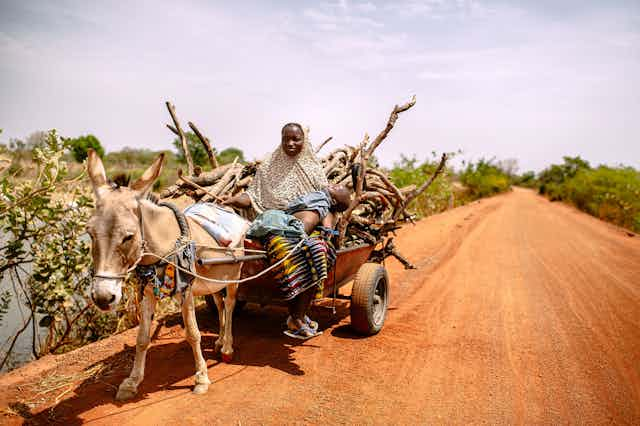

Anika Molesworth ne travaille pas, ne conseille pas, ne possède pas de parts, ne reçoit pas de fonds d'une organisation qui pourrait tirer profit de cet article, et n'a déclaré aucune autre affiliation que son organisme de recherche.
Deakin University apporte un financement en tant que membre adhérent de The Conversation AU.
Voir les partenaires de The Conversation France
Climate change is one of the principal threats to quality – and equality – of life on our planet. Beyond environmental problems, climate change threatens food security, water availability, health, housing and self-determination. In essence, it confronts our basic liberties and pursuit of happiness.
But the burden of climate change impacts is not distributed equally. The poor, women, children and indigenous people face disproportionate risks. For people with no safety net, one drought can mean a tumble into further hardship.
Those hit hardest by climate change are generally the least responsible for causing it, and have the least capacity to adapt. The idea that vulnerable people, particularly in developed nations, should be fairly considered was enshrined in the Paris Agreement, which opens for signing in New York this week.
The preamble notes the importance of “climate justice”. To give effect to this, the agreement emphasises the need to aid developing nations reduce emissions and adapt to climate change.
As an agricultural scientist working in developing countries – and a farmer myself – my work has explored climate justice in terms of the rural poor, a section of our global community hampered by mounting ecological calamity and limited ability to adapt.
Rural climate justice has four key elements.
The distinctive characteristics of rural areas make them uniquely vulnerable to climate change impacts.
Rural areas in developing countries are characterised by a high dependence on agricultural and natural resources; burdened by poverty, isolation and marginality; neglected by policymakers; and ultimately have lower indicators of human development.
Climate change worsens existing deficiencies, exacerbates inequalities and creates new vulnerabilities. Weather impacts – from subtle shifts and trends to extreme events – increasingly threaten and erode basic needs, capabilities and rights of the rural poor.
The Universal Declaration of Human Rights states that basic rights and fundamental freedoms are to be enjoyed by all people, no matter who they are or where they live. It recognises that everyone is entitled to the inherent dignity delivered by the foundations of freedom, justice and peace in the world.
Men and women are affected differently by climate change due to different social and cultural roles. In many rural communities, women form the majority of self-employed, small-scale farmers.
The actions – and inactions – of the present population can jeopardise the rights and well-being of generations yet to come. By delaying climate change action, we risk passing on an irreparably diminished legacy.
The destruction of the environment is a fundamental breach of the principle of intergenerational equity, as it will cause significant flow-on effects to present and future communities.
Climate change causes social degradation via community instability and dislocation, which ultimately undermines cultures. Migration challenges the identity, sovereignty and heritage of people leaving their homelands, as well as the integrity and continuity of their traditional ways of life.
These dispersed and disassociated peoples can cause cascading effects and social disturbances to the communities they leave behind and the communities they enter. Migration is an extreme form of adaptation.
Although separating climate migrants from those moving for other reasons is near-impossible, as climate impacts aggravate existing problems for the rural poor, greater migration from these areas is inevitable.
To deliver climate justice, climate policies need to encompass human rights, gender equality, intergenerational equity and cultural integrity. These policies include mitigation strategies that reduce greenhouse gas emissions, and adaptation strategies to help cope with unavoidable consequences.
Development is not possible without energy, and sustainable development is not possible without access to clean, affordable and renewable energy. This is an opportunity for developing countries to avoid the dependence on fossil fuels seen in today’s developed world.
As climate change and a burgeoning global population increase pressure upon planetary boundaries, agricultural scientists are seeking ways to better manage natural resources and help farmers adapt to current and future climate.
Work with the rural poor that promotes social progress and better standards of life can ultimately provide flexibility and a buffer to adversities, and enable farmers to make well-informed decisions.
For communities most at risk, climate change is disrupting lives, work, food security and the places they call home. Only with the appropriate strategies and commitment to climate justice will the future for all people be brighter.